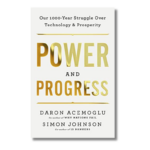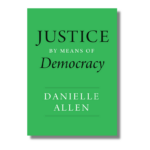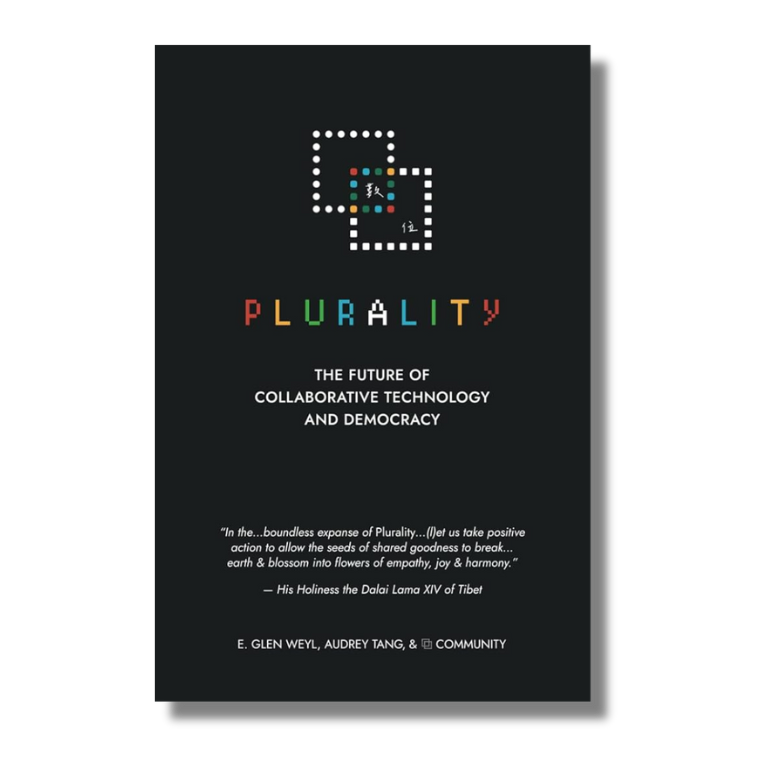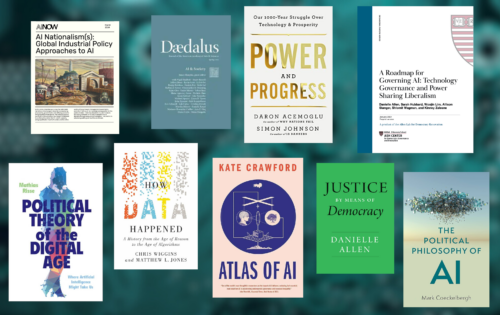2024 is a historic election year for the future of our world’s democracies with over 80 countries voting in elections. This year has also been notably impacted by the rise in novel artificial intelligence systems, which present unprecedented challenges and opportunities for democratic institutions.
The reading list below on AI and Democracy, curated by the GETTING-Plurality Research Network at the Allen Lab for Democracy Renovation, highlights a mix of foundational texts and new thinking on these issues—connecting questions of technology ethics and governance to broader works in democratic theory. The selected material aims to support ideas that technological development should serve broader collective aims and interests, as well as that deliberative democratic governance provides just procedures and most effectively steers towards just ends.
The books and articles below explore the intersections of AI and Democracy rooted across disciplines from philosophy, economics, political theory, history, policy development, and more.
Books
Power and Progress: Our Thousand-Year Struggle Over Technology and Prosperity by Daron Acemoglu and Simon Johnson 
Daron Acemoglu and Simon Johnson tell a sweeping story challenging economistic conceptions of technological progress and automation.
Justice by Means of Democracy by Danielle Allen 
Danielle Allen outlines her mature theory of democratic justice, a product of several decades of work on deliberation, democracy, policy, and political economy.
The Political Philosophy of AI: An Introduction by Mark Coeckelbergh 
Coeckelbergh builds on a decade of work on the philosophy of technology to develop a manageable yet thorough introduction to various approaches in the philosophy of AI.
Plurality: The Future of Collaborative Technology and Democracy by E. Glen Weyl, Audrey Tang, and Plurality Community
 Weyl and Tang, along with an open-source community of contributors, develop a new narrative for the direction of technological development in support of democracy. Building off the successes from Taiwan’s experiments in digital democracy, this book explores how digital tools could strengthen both social unity and diversity, outlining a vision for a world with Plurality.
Weyl and Tang, along with an open-source community of contributors, develop a new narrative for the direction of technological development in support of democracy. Building off the successes from Taiwan’s experiments in digital democracy, this book explores how digital tools could strengthen both social unity and diversity, outlining a vision for a world with Plurality.
Atlas of AI: Power, Politics, and the Planetary Costs of Artificial Intelligence by Kate Crawford 
This is a magisterial overview of the material inputs and physical substrates behind abstract, data-based AI systems. Crawford identifies the power struggles and submerged politics behind contemporary technological systems.
Political Theory of the Digital Age: Where Artificial Intelligence Might Take Us by Mathias Risse 
Risse’s book deals significantly with the kinds of epistemological threats posed by novel digital technologies, examining questions of verification and public discourse in the ‘digital age.’
How Data Happened: a History from the Age of Reason to the Age of Algorithms by Chris Wiggins and Matthew L. Jones 
This history of the emergence of data as a fundamental unit of knowledge contextualizes the epistemology of contemporary AI, examining how it came to be that technologists believed human behavior could be so thoroughly measured and transformed into discreet packets of “data.”
Articles and Essays
A Roadmap for Governing AI: Technology Governance and Power Sharing Liberalism by Danielle Allen, Sarah Hubbard, Woojin Lim, Allison, Stanger, Shlomit Wagman, and Kinney Zalesne 
Allen and her co-authors outline an approach to AI governance drawing on her political theory, one which aims to govern technology with an eye towards human flourishing and power-sharing liberalism.
Artificial Intelligence, Humanistic Ethics by John Tasioulas 
Tasioulas makes a necessary case for humanistic values behind technological development.
Can Democracy Survive Artificial General Intelligence? by Alex Pascal and Seth Lazar 
Alex Pascal and Seth Lazar question the phantasmagoric aim of “AGI” that drives much of contemporary technological development in places like OpenAI, arguing that it is neither a clear nor necessarily desirable goal.
AI Nationalism(s): Global Industrial Policy Approaches to AI by AI Now 
AI Now, a leading organization conducting research and advocacy on AI, produced this powerful series of essays on industrial policy and AI governance, arguing for robust regulatory action to curtail the monopolistic power of big tech.
Other
Convening: Allen Lab for Democracy Renovation Conference on the Political Economy of Artificial Intelligence 
This convening invited experts in political economy, the history of science, and the ethics of technology to discuss the ways contemporary paradigms in technological development privilege the powerful and enable the centralization of corporate power.
New America Roundtable on Power and Governance in the Age of AI 
This roundtable featured leading voices from the Ash Center (including Bruce Schneier) and other organizations demanding greater power-sharing and accountability in technological development.






 Weyl and Tang, along with an open-source community of contributors, develop a new narrative for the direction of technological development in support of democracy. Building off the successes from Taiwan’s experiments in digital democracy, this book explores how digital tools could strengthen both social unity and diversity, outlining a vision for a world with Plurality.
Weyl and Tang, along with an open-source community of contributors, develop a new narrative for the direction of technological development in support of democracy. Building off the successes from Taiwan’s experiments in digital democracy, this book explores how digital tools could strengthen both social unity and diversity, outlining a vision for a world with Plurality.











